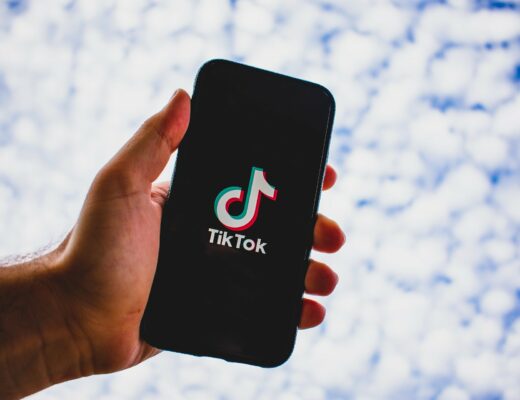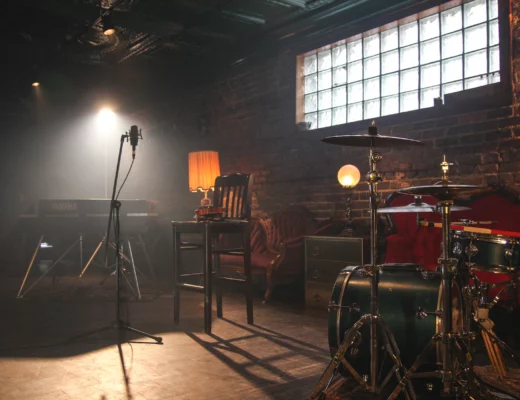If you experienced Myspace, no matter what TikTok does (we are talking about the platform here, not the creators, before you start bemoaning the dance moves and the lip-syncing proclivities), it will probably never scratch the nostalgic itch.
For younger independent artists oblivious to the culture of Myspace, there is little hesitation to jump on what became the most visited website in 2021. You can see it as a sad sign of the times that users spend more than 850 minutes every month on the app, or you can also see it as one of the best opportunities the internet has extended to artists looking to cast their digital net wider.
Just about anything can go viral on TikTok, proven by the sea shanty trend in 2021. And for anyone that thinks TikTok is for ingrates who blasphemously appropriate music culture, think again. 40% of active users of TikTok have a monthly music subscription, compared to 25% of the general population. Even more remarkably, only 9% of the general population frequently buy merch; for TikTok users, it is 17%. That is before you consider how many users get inspired by music before putting it into their posts.
TikTok has become so vital to the music industry that publishers change track names to how they are referred to on TikTok. And don’t forget about the deal signed between UnitedMasters and TikTok in 2021.
What We Can Learn from the Legacy of Myspace
Myspace used to be one of the best platforms for music discovery. Facebook may have left it dead and buried but social media is still the number 1 method of discovering music for Gen Z and Millennial music fans, followed by YouTube videos, recommendations from friends, radio, TV shows, and soundtracks.
In 2022, TikTok is as renowned for its viral video humour as it is famous for launching new artists’ careers. Lil Nas X, Tai Verdes, Loren Gray, and Baby Ariel have TikTok to thank for their stratospheric fame and revered positions in the music industry.
The other remarkable feat of Myspace was its networking capabilities; it became a place for artists to create genuine connections with fans, other bands, venues, and other figureheads in the music industry.
Newsflash, it is still easy to create connections online. The real issue with music promotion in 2022 isn’t the inability to make those connections; it is the undeniable oversaturation in the music industry; there are more artists on Spotify than people living in Hong Kong. The fault does not lie with the technology of today. The fault lies within the cramped confines of the industry, filled with fame-hungry chancers looking for adoration and easy money. The good news is that these narcissistic hacks are easily separable from talented artists. The difference lies within the art and the effort to ensure it is heard. Now, there are more platforms than ever to expand your reach and collect royalties.
How the SoundOn Feature Became a Game Changer for Unsigned Artists
In 2022, TikTok launched its new SoundOn initiative across the US and the UK to support unsigned artists. The feature allows artists to licence their tracks for use on the platform via the partner streaming service, Resso.
The SoundOn feature enables artists to upload music and earn royalties. In the first year, artists will receive 100% of their royalties; after that, it drops to a still very reasonable 90%. As the cherry on the self-promo cake, the feature also offers a range of promotional tools and support.
Anyone Can Go Viral on TikTok
TikTok has become one of the ultimate equalisers of our technology-driven times. Forget Twitter, which leaves sycophants in a frenzy every time the object of their infatuation Tweets about their breakfast and bowel movements and ignores the voices that deserve to be heard.
Forget Facebook, which will all too happily effectively leave you screaming into the void while you are attempting to promote your new single, album, merch or tour. To go viral on TikTok, you don’t need thousands or millions of followers at your disposal or a massive social media marketing budget; all you need is a little creativity; which should be something that artists have in abundance.
How to Create Viral Worthy Posts to Promote Your Music on TikTok
– Keep it short and sweet. TikTok may be a great platform, but it can’t lengthen the tragically short attention span of social media users. 8 – 15 seconds seems to be the sweet spot. So, share the hookiest segment of your new track or the most eye-grabbing fragment of your new music video.
– Stay in trend. Even if you don’t bow to the mainstream trends with your music, if you want TikTok success, you might have to make an exception to that rule. Head to the discover page to find out what is trending in your niche and make the algorithms take your content to new heights.
– Don’t use generic hashtags. When finalising your TikTok posts, don’t be tempted to use the most obvious tags. Do a deep dive on the trending tags for your niche on the platform itself, and utilise sites such as tophashtags.com.
– Collaborate with popular creators. Influencers, including TikTok influencers, are becoming increasingly valuable for independent artists looking for effective music promotion. As the adage goes, if you can’t beat them, join them! Offer your music for other popular creators in your niche to use in their videos.
Conclusion
I don’t want to get all Dr Pepper on you, but what is the worst that can happen if you choose to invest some of your time in promoting your music on the platform? In 2020, 70 unsigned artists snagged major record label deals, which may not sound too impressive, given the number of independent artists releasing music. But getting signed to a label isn’t the be-all and end-all for artists anymore. With a loyal enough following, there is no stopping independent artists from being able to fund their music careers and running things on their terms.
Amelia Vandergast




1 Comment
Spotify has jumped on the TikTokification bandwagon with Discovery Mode -
13 March 2023 at 7:01 pm[…] streaming era of music has already changed the way some artists write songs. Extended intros and quiescent interludes have been forsaken for the allure of earwormy instant hooks; every skip on a track is negative data for Spotify’s algorithm. Who can blame artists for […]